Hello! Welcome to Everything Is Amazing, a newsletter about curiosity, attention, wonder and, just occasionally, highly inspiring carrots.
And that was Season 3. Since October, it’s been 16 newsletters on all sorts of fascinating, deeply strange curiosities, loosely clustered around the topic of optical illisions.
(And there are now over twice as many of you reading as at the end of last season - so, you know, *blimey*.)
Here’s what we covered.
Seeing
1. The Best Virtual Lightshow You’ll Ever (Not) See
“One day in earlier January, city resident Steph Nixon took this photo. What the hell…? Some kind of mass celebration with multicoloured spotlights? A critical footie game? Nope, nothing scheduled. So - what was it?
I saw nothing about this Twitter kerfuffle at the time, despite living less than 40 miles away. I also didn’t see anything in the sky when I went for my early evening walks.
But that’s not surprising. It’s very hard to see something that isn’t actually there.”
(The Twitter thread I did to promote this went absolutely bananas, reaching over a million people. I’m still floored by this. Hello from the floor.)
2. The Science Of Seeing What Isn’t There
“So these visions are real?
Yes. They absolutely are. They’re not someone’s fevered imaginings. There are now thousands of credible observations of them captured on camera, not just by floating-city enthusiasts but by journalists, sailors, businessmen on the way to work, everyone who was around at the time, on a scale that defies even the most paranoid imaginings of any conspiracy theorist (you’d hope, anyway)…
If you’re sceptical that these are all legit, I applaud you. Photos and video are so easily faked nowadays. At least one atmospheric scientist is unsure one of those videos up there from China isn’t fabricated. (And as a general demonstration of what’s possible these days - deepfake Tom Cruise, anyone?) Also, me telling you these are real - well, I could be deluded. Or lying! You’d be right to question my opinion and ask for something that backs it up. Asking questions is always good, when you have the opportunity (or privilege) to do so.
So by way of evidence that these visions aren’t fictitious, here’s one of the more trustworthy news services from my country, reporting on a floating ship in March of this year.”
(More floating weirdness can be found in the Twitter thread I did on this.)
3. Why Everywhere We Look, Where We Are
“It’s 1994, and Diana Duyser can’t believe her eyes.
“I went to take a bite out of it, and then I saw this lady looking back at me," she’ll later tell the Chicago Tribune newspaper.
She yells to her husband to come look, and they stand transfixed above what will come to be known as the Holy Toast. What does it mean? Because it must mean something, surely?
Then she does what any of us would do: she packs it in cotton wool in a clear plastic box and waits for eBay to be invented so she can auction it off to GoldenPalace.com for $28,000.”
(My Twitter thread for this has lots of other examples, including - gnnnn - Wordle pareidolia, which now seems to be a thing. How frighteningly quickly we’ve all fallen for this little wordgame.)
4. A Map Of The Internet Part 1: What does it actually look like? [Paid Subscribers Only]
“However you choose to look at it, the Internet is so big and so complex at this point to be basically unknowable. Taken as a whole, it’s terra mysterium at this point. Not just because of the size of it - approaching 2 billion websites, as of early 2021 - but because the actual shape of this thing seems beyond our comprehension, even though we use it every day…
Here’s why I think this isn’t just a topic for idle nerding-out. As a travel writer, I’ve written about the benefits of getting yourself lost (aka spatial navigation psychology) - and there are a fair few! It’s a workout for a part of your brain that needs the exercise, because we so rarely exert it these days. Fascinating topic, don’t let me get started.
However, being permanently lost, having no sense of your bearings over a sizeable amount of time, is incredibly stressful, as illustrated by thousands of real-life stories of survival in the middle of nowhere. And as I wrote about last season, that kind of “I’m just trying to survive” stress erodes or just plain kills your ability to be curious.
Considering how easy it is to venture online and immediately be clickbaited into corners of the Web we don’t recognise, or have our attention hijacked by opinions and issues we had no intention of engaging with today - isn’t that another way of saying we immediately get lost when we first log in? And then stay lost?”
5. Fooling With Certainty: The Impossibly Real Worlds Of MC Escher
“Escher’s love of the fantastical is primarily inspired by what he sees around him, not what he can dream up out of next to nothing.
In a lecture later in his life, he’ll explain this further:
“If you want to express something impossible, you must keep to certain rules. The element of mystery to which you want to draw attention should be surrounded and veiled by a quite obvious, readily recognisable commonness.”
By looking closely at the real world, and trying to understand how it works, Escher will invite his initially small but intensely loyal fanbase to explore some very strange mysteries indeed.”
6. “Like Tripping Without The Drugs”: The Science Of Extreme Staring
“Journalist Jenni Avins tried something similar in 2015 (“I just took a brief hallucination break with a colleague”) and wrote it up for Quartz:
“Then she told me why she laughed halfway through our sitting. ”You started to look like a weird little animal!” she said.
“YOU started to look like an animal!” I shrieked. “A lion!”
“You were a lion!” she yelled. “A lioness,” she corrected herself.”
What’s going on here?”
7. The Room With An Impossible View
“Got that?
No you haven’t. You may think you’ve got it, but if you were looking through that viewing peephole, your mind would be instantly overwhelmed with what it looks like, instead of what it truly is. Instantly. One heartbeat, maybe two, and you’re lost. The illusion has you. The illusion takes everyone.”
Thinking
8. A Map Of The Internet Part 2: Going The Wrong Way [Paid Subscribers Only]
“In his new book 4,000 Weeks: Time And How To Use It, journalist Oliver Burkeman points out the tragic flaw at the heart of a lot of productivity literature. If you’re overrun with things you really don’t enjoy doing, and attack the problem by learning how to process them quicker, it won’t be long before more of those things will be pelting you every day, forcing you to work a little longer - and then you realise you’re having an even less pleasant experience across exactly the same amount of time as before. A perfect recipe for occupational misery.
(This is a variation of Parkinson’s Law: “work expands so as to fill the time available for its completion.” Isaac Asimov’s wry version of this: “In ten hours a day you have time to fall twice as far behind your commitments as in five hours a day.”)
…I’d done two things wrong. I had created a schedule, not a map - and I’d made the awful mistake of thinking the solution was about efficiency, thereby completely ignoring the “you have to make it fun or it’s not worth it” side of things.
Whoops.”
9. Here’s Why You Won’t Read This Newsletter
“It’s also incredible that any of you are reading - hopefully not because this email is unusually rubbish, but because reading itself is such a thoroughly miraculous dance of sensory mechanics.
Take the following statement:
Apparently one in three Britons are conceived in an IKEA bed, which is crazy if you think about it because those places are really well lit.
Okay. If I asked you to describe the experience of reading that line, you’d probably say your eyes smoothly moved from left to right.
But they didn’t. That’s not how we read at all.”
10. The Metaverse Sounds Hauntingly Awful
“What we need from the Metaverse is technology that encourages us to go outside, to form a deeper relationship with the actual natural world around us, and to start caring about it so much that we take action and learn how to slam the brakes on the wheels of this runaway train.
(A good start: holding politicians fully accountable to their promises. Just an idea.)
What we definitely don’t need is to stay indoors, using technology to pretend there’s nothing wrong with the view from our window.”
11. Lola Akinmade Åkerström Is Telling The Right Stories
“I think people should stop worrying about relevance, and focus on evolution. When you keep focusing on staying relevant, you can't easily pivot away when you feel like, Oh no, I'm living my life for other people. You feel pressure to keep up, do things this way, say these things, otherwise I will fall behind.
But when you think about evolution, you're actually evolving to the best version of yourself in that time of your life. You're not supposed to stay stagnant. I'm not supposed to be, say, the older lady trying to keep up with 18-year-olds. It just doesn't make sense.”
12. The Troubling Science Of What Happens Next
“This is the essence of effective dramatic tension: stringing your audiences along until the next big reveal, always keeping something back from them, and leaving them to marinade in their own frustration…
It’s immensely annoying, yet it extracts billions of dollars from us every year. (Just ask Marvel.) There’s no question it’s hugely important to professional storytellers, marketers and anyone with anything to sell…
But is it actually good for us?”
Doing
13. 4 Stupid Ways To Have A Better 2022
“I’m a big fan of this flavour of foolishness, and I think it can make the world better, or at least more bearable. And it can do wonders for your curiosity - which is another way of saying it makes the world more bearable.
With that in mind, here are four suggestions for how you can gently, constructively enstupid your 2022. Please proceed with just the right amount of idiotic recklessness.”
14. What A Weird Way To Write A Book [Paid Subscribers Only]
“There’s an entrepreneurial twenty-something writer from London whose work you really should read. No exaggeration: it’s world-changing stuff…
The first instalment shifted a healthy 1,000 copies; the last sold about 40,000 - and since Boz quickly saw the value of bundling the instalments into a single book at the end, he started his next series with that book firmly in mind - while continuing to play on all the strengths of serialization that he'd discovered with the previous story. It was a career-building model.
At the age of 25, the book was fully out, making Boz obnoxiously wealthy. Maybe you’ve read it? It’s called The Posthumous Papers Of The Pickwick Club - and Boz's real name is Charles Dickens.”
15. How To Reconnect: A November Challenge [Paid Subscribers Only]
“…then you realise what your favourite childhood reads can still do for you as an adult. Old diaries, old correspondences. Abandoned blogs. Anything that gives you an insight into what you were thinking ten, twenty, thirty years ago (or further) - maybe as opposed to what you think you were thinking.
There’s so much to discover. Maybe even a whole new Marvel What If version of yourself, amid the cringeworthy stuff that’ll probably make you wince. (I didn’t say this process was easy.)
Give yourself a week to go find something you’ve forgotten about who you were. Go find something incredible.”
‘Parents often have a sense of inadequacy when confronted on the one hand with the eager, sensitive mind of a child and on the other with a world of complex physical nature, inhabited by a life so various and unfamiliar that it seems hopeless to reduce it to order and knowledge. In a mood of self-defeat, they exclaim, “How can I possibly teach my child about nature—why, I don’t even know one bird from another!”
I sincerely believe that for the child, and for the parent seeking to guide him, it is not half so important to know as to feel.’
- Rachel Carson, The Sense Of Wonder.
BONUS: I had the immense pleasure to be interviewed about Everything Is Amazing last week. Listen to the recording here.
(If you’re wondering if I sound the same in person as I do in this newsletter, sadly, the answer is a hard Yes. Have a listen to gauge the full tragedy of it.)
Why I Really Need Your Help
These are the mountains of the isle of Arran, a short train & ferry ride away from where I am now. At the end of next week, I’m heading there for a few days, for a bit of recreational shivering in my tent, and to blunder around the lowlands in an incompetent but amiable manner that will fill me with joy while hopefully not alarming the locals & wildlife too much.
I really need a proper break, so I can’t wait - and I’m also doing a bit of research for the theme of season 4 of this newsletter. More on that soon.
With that in mind, I have a bit of a weird question: how do you feel about another season of Everything Is Amazing?
I can tell you that from this side of the fence, I increasingly feel the opposite of done with this whole topic. What started out as an idiotic question about my dad has turned into two hefty notebooks bulging with notes & questions on the learnable skills of curiosity, awe and wonder. I feel like there’s ten times more to explore here than when I first started…
And there’s something else, too. Yes, this is a more or less a scientific-curiosities newsletter intended to raise your eyebrows at how marvelous the world is if you slow down and look - but it also started as self-therapy.
EiA began because I wanting to recapture my enthusiasm for life, and to learn some practical, learnable everyday ways of doing that - and it’s made me more hopeful. Not in a self-deluding “everything’s going to be fine, take a chill-pill” way, but in a truer, messier, harder-won sense. Making yourself more curious doesn’t fix any of the big problems in the world (not directly, anyway) - but it does massively increase your capacity for feeling all the feelings that make life worth living.
So, this newsletter is going to touch on that too. Because it’s important. We probably don’t need more diversive-curiosity distractions (j’accuse moi aussi) - but we certainly do need to find better, deeper, more reliable ways to feel hopeful. I reckon hopefulness is the Being Able To Show Up skill - and I also reckon it’s needed more than ever. Can curiosity help here? From what I’ve learned this year, the answer seems to be a ludicrously enthusiastic Hell Yes.
(The same goes for what seems to be the least-appreciated and most-important form of curiosity: empathic curiosity, the ability to understand and emotionally identify with another person’s viewpoint. You may have noticed that certain parts of the Internet these days are…yelly? There’s a lot of yelling out there. And empathic curiosity is the anti-yelling skill. If there was more of it online, the Internet would be quieter and less stressful and also maybe a lot more interesting. So I feel that’s a big deal, right there. Lots to uncover.)
There’s so much more here…
But to get to it, I need your help.
At the end of last season, I launched the paid version of this newsletter. There are now over fifty of you helping me write this thing, and it’s been a huge step towards getting the support I need to be able to devote the right amount of time towards it…
But - I’m not there yet. I still have a certain way to go, and until then, I’m splitting my time with other work just so I can keep paying my bills. I’d love to show up fully to this thing - but right now, I just can’t.
Could you help?
Would you consider a paid subscription? A discounted, one, I mean? To help me get closer to making this newsletter what I believe it can become?
From now until the end of Monday (24th January), a year’s subscription is $45, which is 25% off the normal rate - and also, as with my existing discount-offer subscribers, that’ll be 25% off the yearly rate forever, for as long as you want to support this newsletter:
What You’ll Get
This is where I become hilariously/facepalmingly useless at marketing my own work.
If you’re on my Free list, you’re still going to get 80% of everything I’m doing here. I thought long & hard about this. I know some folk like to paywall off their best work, and I know it works well for them. But I’m not doing that. It’d feel wrong, and contrary to the curiosity-is-open-to-everyone spirit of much of this newsletter.
If you remain Free, you’ve already given me something of inestimable value: your attention. Our Inboxes are raging poop-fires at the best of times, so the fact you’re actually reading this, even if it’s just occasionally? “Thank you” falls woefully short. I just don’t have the words. And I don’t want to become disrespectful of your time, or misplace my gratitude, in any way.
So: the main reason to go Paid, at whatever level you wish to do it, is because you want this newsletter to exist. That’s the biggest reason. That’s what you’re doing: you’re directly helping me show up to make it, and helping it get even better. You’re becoming the How It Gets Done.
(But I intend for that remaining paywalled 20% to be fun too - and a bit more practical, more “here’s some damn-fool thing you can try, so you can look just as much of an idiot as I do!”)
(I told you I was terrible at marketing.)
What say you?
Whatever your decision here, thank you so much for giving your precious time to Everything Is Amazing until now - and believe me when I say we’ve only just got started here. (I’ve got entire notebooks that prove it.)
Cheers,
Mike.
Photo of Arran: Ian Cylkowski

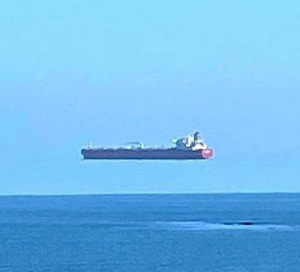



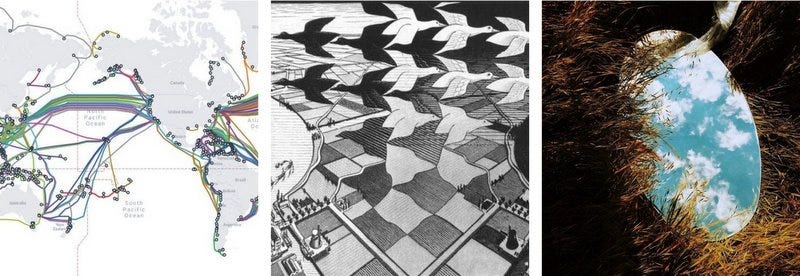
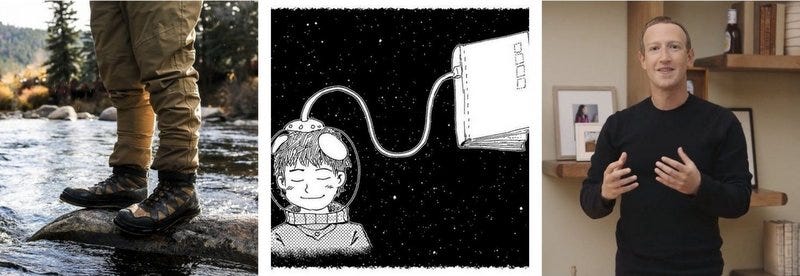

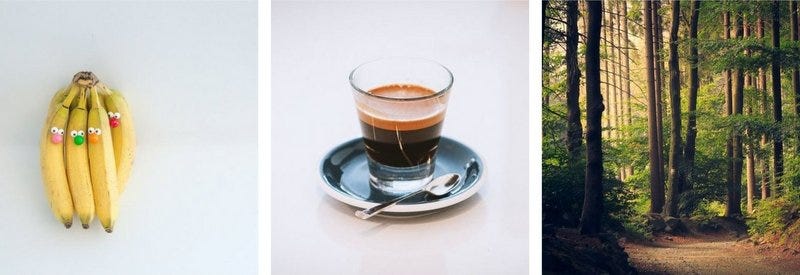
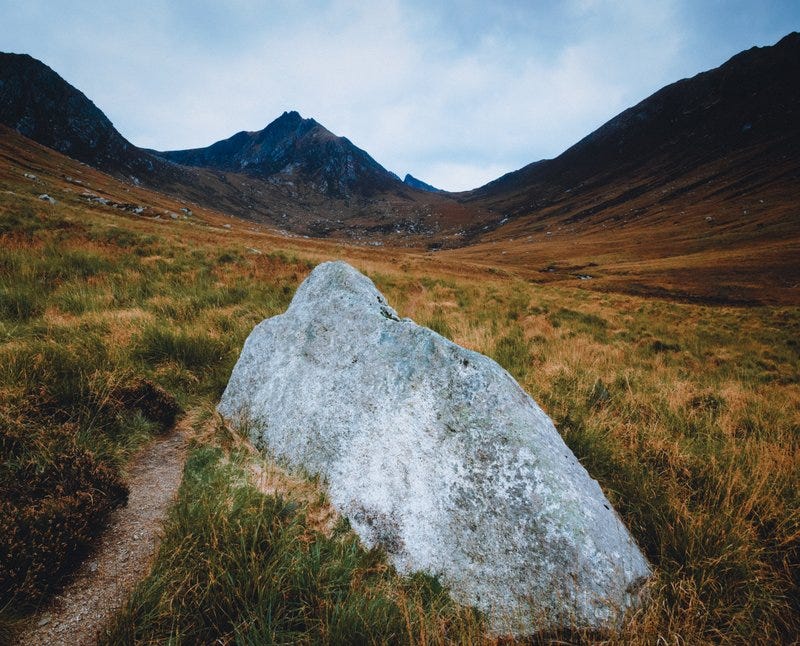
Without curiosity we might as well sit in a pit and stop breathing. My dad, at 80, said he liked learning something new everyday. He was mostly deaf and almost dead blind at the time, BUT he always had a "you know what..." when I called. Carry on!
Congrats on your well deserved success this year. And on working Wordle into the newsletter! ( But I love Wordle, so it's good!) I watched l especially enjoyed the science of what comes next, since I'm also a novelist and that's something that I trade in.